Published
- 19 min read
Best Scaleway Alternatives for Infrastructure & Performance

Key Highlights
- Scaleway alternatives are in demand in 2025 as businesses look for better pricing, global coverage, and reliable support.
- The most popular competitors include Kuberns, OVHcloud, Hetzner, Kamatera, DigitalOcean, Linode, UpCloud, GCP, and Azure.
- Businesses leave Scaleway due to limited regions, unpredictable bandwidth costs, and support challenges.
- Kuberns is often the recommended Scaleway alternative. It simplifies cloud deployment, saves up to 40% on AWS infrastructure, and offers stress-free scaling.
- This guide compares Scaleway with its top alternatives, includes a side-by-side overview table, and explains why businesses choose smarter platforms like Kuberns.
Introduction
Scaleway alternatives are becoming an important search for businesses that want more flexibility, better pricing, and stronger global coverage than Scaleway currently offers. While Scaleway has built a reputation in Europe as a cost-effective cloud hosting provider, many companies discover its limitations once they begin to scale.
Common challenges include limited data centre regions outside the EU, unpredictable egress charges, and a smaller ecosystem compared to global IaaS leaders.
As a result, businesses often compare Scaleway with providers like Kuberns, OVHcloud, Hetzner, Kamatera, DigitalOcean, and Linode to see which option better supports long-term growth.
In this article, we’ll walk through the best Scaleway alternatives in 2025 and compare them in an overview table.
Along the way, we’ll also link to in-depth guides on OVH alternatives, Hetzner competitors, and Cloudways alternatives to give you a broader perspective across the cloud hosting market.
Why Consider a Scaleway Alternative in 2025?
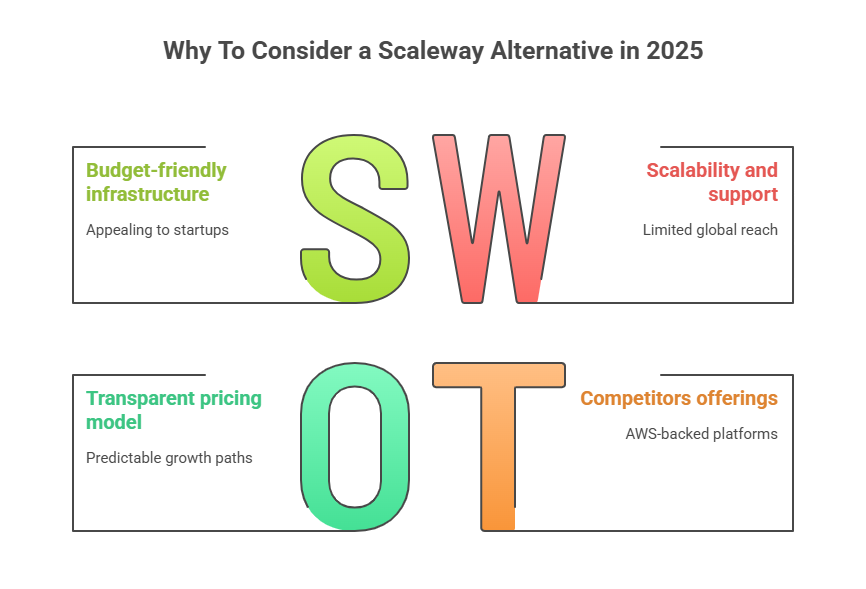 Scaleway has established itself as a competitive player in the European cloud hosting market, appealing to startups and developers who want budget-friendly infrastructure. For early-stage projects or local deployments, Scaleway’s pricing looks attractive.
Scaleway has established itself as a competitive player in the European cloud hosting market, appealing to startups and developers who want budget-friendly infrastructure. For early-stage projects or local deployments, Scaleway’s pricing looks attractive.
However, as businesses scale beyond MVPs into SaaS platforms, global e-commerce, or enterprise-grade applications, Scaleway’s limitations become harder to ignore.
This shift is what drives demand for Scaleway alternatives that can deliver more predictable pricing, global reach, and enterprise-ready reliability.
Here are the main challenges businesses face with Scaleway and why they seek alternatives:
Limited Global Reach
Scaleway’s data centres are mostly concentrated in Europe. While this works for EU-focused businesses, it becomes a bottleneck for companies with customers in North America, Asia, or other high-growth regions. Latency issues directly affect user experience, especially for SaaS and e-commerce platforms. By contrast, alternatives like Hetzner remain strong in Europe, while providers such as AWS-backed platforms, Kamatera, or Vultr deliver broader international coverage for global teams.
Unpredictable Bandwidth and Egress Costs
One of the recurring complaints about Scaleway is the unpredictability of its cloud hosting costs, especially around bandwidth and egress. Businesses that transfer large amounts of data, such as media companies, analytics platforms, or global SaaS applications, find their bills rising unexpectedly. This lack of pricing clarity makes financial planning difficult. Competitors like Kuberns solve this problem by offering transparent pricing on AWS-backed infrastructure, with up to 40% cost savings for businesses that need scalable cloud hosting.
Smaller Ecosystem and Limited Services
Scaleway provides the essentials: compute, storage, and networking, but its ecosystem of tools and services is relatively narrow. Businesses running modern workloads like containerised applications, APIs, AI/ML projects, or multi-environment DevOps pipelines often find the platform restrictive.
Alternatives like OVHcloud or Azure come with a more robust catalogue, while bundles CI/CD, monitoring, and scaling into one simple platform tailored for developers and enterprises alike.
Support and Reliability Gaps
While Scaleway offers documentation and community resources, its support options are limited compared to larger IaaS providers. For enterprises that need guaranteed uptime, dedicated SLAs, and hands-on migration help, this can be a dealbreaker.
Businesses in industries like finance, healthcare, and logistics, where downtime directly impacts revenue, often move to providers with stronger enterprise-grade support.
Scalability for Growing Businesses
Scaleway can handle small workloads well, but scaling applications globally is where many companies encounter friction. For startups growing into mid-sized SaaS providers or agencies managing multiple client projects, seamless scaling and automation are non-negotiable. That’s why businesses explore competitors that provide developer-friendly automation, stress-free scaling, and predictable growth paths.
Scaleway remains a good entry point for local European projects, but its limitations in cost transparency, global reach, and scalability make it less suitable for modern businesses. The demand for Scaleway alternatives has grown because companies now prioritise long-term stability, predictable pricing, and infrastructure that can scale with their ambitions.
What to Look for in a Scaleway Alternative?
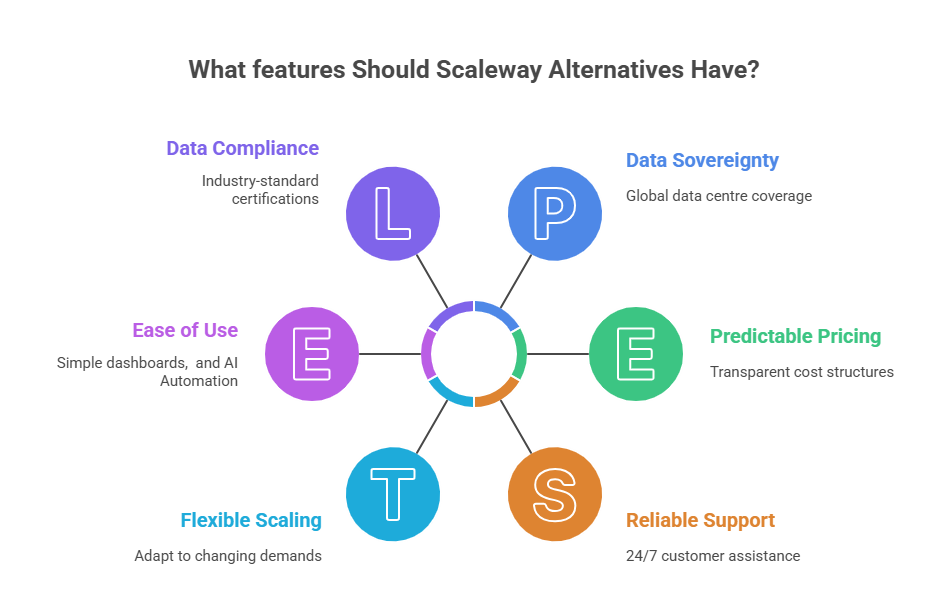 When evaluating Scaleway alternatives, it’s important to look beyond the price tag. Many businesses initially choose Scaleway because of its affordability, but the real question is whether the platform can support your long-term growth.
When evaluating Scaleway alternatives, it’s important to look beyond the price tag. Many businesses initially choose Scaleway because of its affordability, but the real question is whether the platform can support your long-term growth.
Whether you’re a startup testing an MVP, an agency managing multiple client projects, or an enterprise scaling global infrastructure, here are the factors that matter most when choosing a Scaleway competitor in 2025:
Transparent and Predictable Pricing
One of the most common reasons businesses leave Scaleway is unpredictable bandwidth and egress costs. A strong alternative should offer clear pricing models without hidden fees for storage, networking, or scaling.
For example, OVHcloud is often praised for cost efficiency in Europe, while modern platforms like Kuberns provide predictable AWS-backed pricing with up to 40% savings for businesses looking to optimise cloud spending.
Global Data Centre Coverage
Scaleway’s infrastructure is heavily EU-focused, which creates latency challenges for international users. If your business has a global audience, look for providers with wide data centre coverage in the US, Asia, and beyond.
Options like Hetzner remain popular in Europe, while Kamatera and cloud platforms built on AWS provide worldwide reach with consistent performance.
Scalability and Flexibility for Modern Workloads
Cloud hosting today is not just about running websites. Businesses need platforms that can handle containerised apps, SaaS products, APIs, and CI/CD pipelines. Scaleway alternatives should support flexible scaling without downtime and allow businesses to adapt quickly to changing demands.
Platforms such as Kuberns stand out by offering built-in CI/CD, monitoring, and autoscaling, reducing the need for multiple third-party tools.
Developer Experience and Ease of Use
For developers, cloud infrastructure should accelerate workflows rather than slow them down. Look for alternatives with simple dashboards, Git-based deployments, and automation that eliminates repetitive tasks. This is especially critical for startups and agencies that may not have full DevOps teams. Providers like DigitalOcean emphasise simplicity, while Kuberns combines ease of use with enterprise-grade features.
Strong Support and Reliability
Businesses in industries like e-commerce, finance, and healthcare cannot afford downtime. Scaleway’s limited support is often cited as a challenge, making it critical to choose an alternative that offers 24/7 support, SLAs, and migration assistance.
OVHcloud and Azure have enterprise-grade support structures, while Kuberns adds hands-on assistance for teams that want stress-free onboarding.
Industry-Specific Compliance and Security
If your business handles sensitive data, such as in healthcare, fintech, or logistics, compliance is a top priority.
Many Scaleway competitors, such as GCP and Azure, offer industry-standard compliance certifications. For SMBs and startups, Kuberns provides built-in monitoring and secure deployments without needing a dedicated DevOps or compliance team.
By evaluating these factors, you can choose a Scaleway alternative that aligns with your industry requirements and growth plans.
The goal is not just to replace Scaleway, but to upgrade to a platform that offers predictable pricing, global scalability, developer-friendly tools, and reliable support.
Top Scaleway Alternatives in 2025
If Scaleway no longer meets your needs, there are several cloud hosting and IaaS providers that deliver better global reach, predictable pricing, and developer-friendly features.
Below is a ranked list of the best Scaleway alternatives in 2025:
1. Kuberns
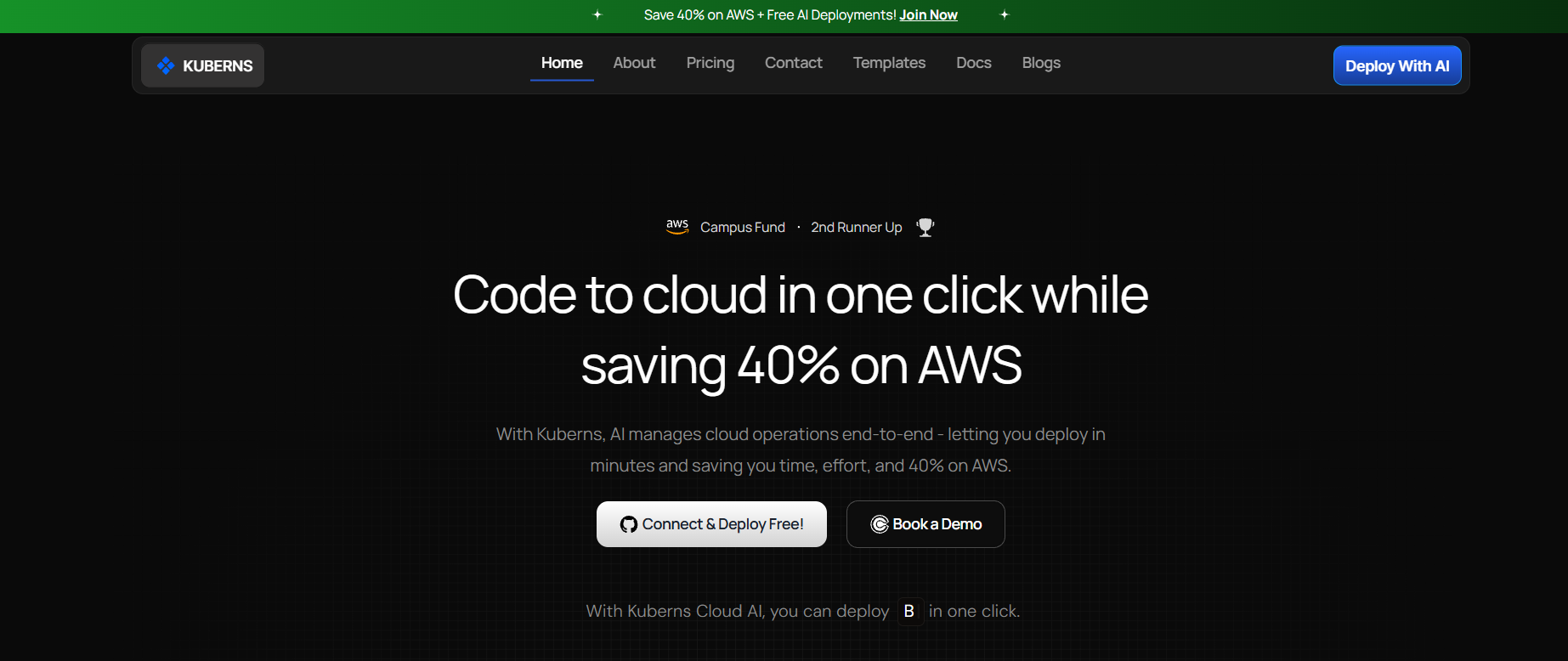 Kuberns is built for businesses that want the simplicity of managed hosting combined with the power of IaaS.
Kuberns is built for businesses that want the simplicity of managed hosting combined with the power of IaaS.
Instead of charging a premium layer on top of providers (like Cloudways does), Kuberns directly runs on AWS-backed infrastructure and passes up to 40% savings to its users through AI-driven cost optimisation.
What makes Kuberns different is that it’s designed for modern workloads: SaaS platforms, APIs, and containerised applications, not just websites.
With one-click Git-based deployments, built-in CI/CD pipelines, monitoring, and autoscaling, businesses no longer need dedicated DevOps teams to manage infrastructure.
- Pros: Transparent AWS-based pricing, saves up to 40%, AI-powered scaling, one-click deployments, and global reach.
- Best For: Startups, SaaS teams, and agencies that want predictable pricing and scalable cloud hosting without DevOps complexity.
Learn more: What is Kuberns? A simpler way to deploy and scale apps.
2. OVHcloud
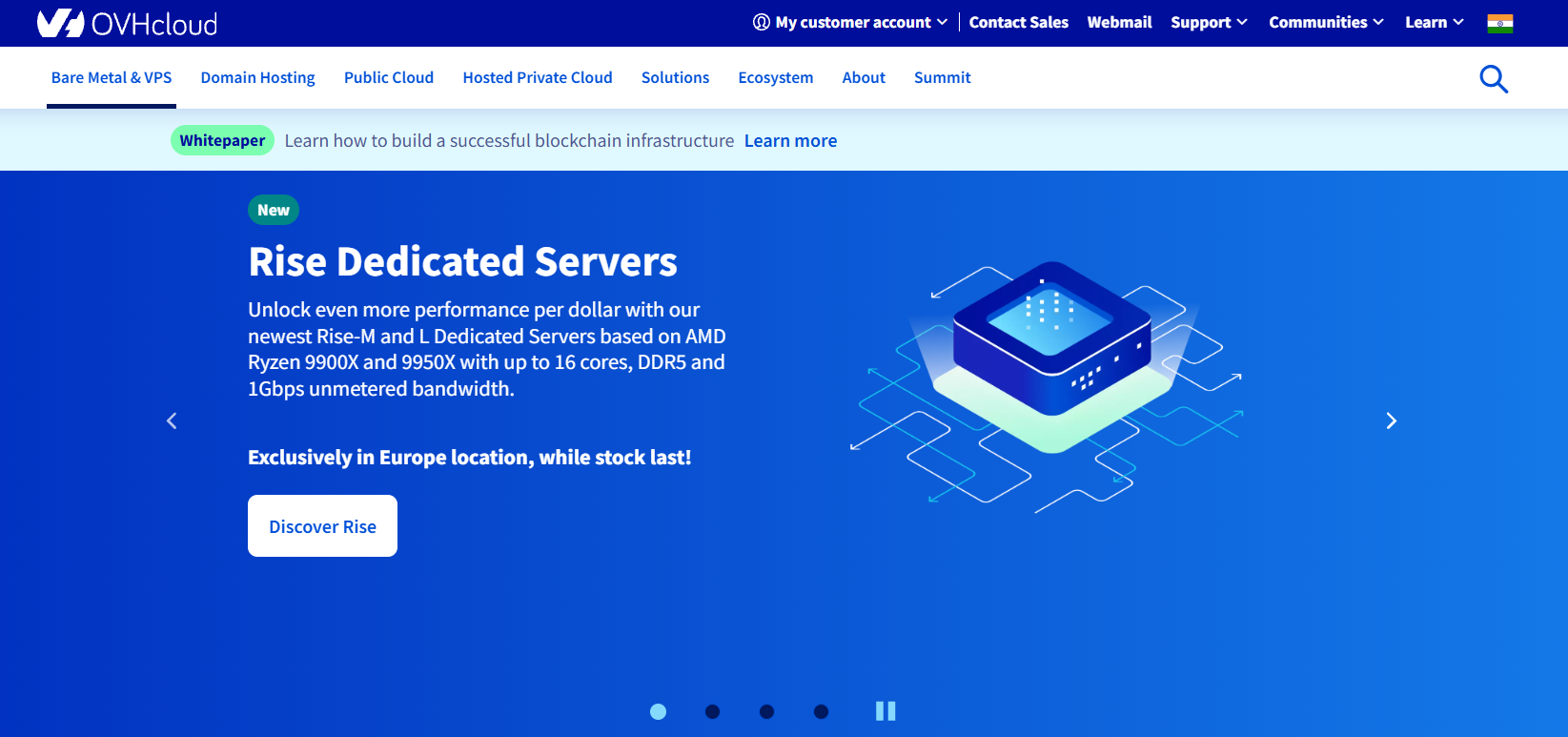 OVHcloud is one of the biggest European cloud providers and a strong Scaleway alternative for businesses that want affordable infrastructure-as-a-service combined with compliance guarantees.
OVHcloud is one of the biggest European cloud providers and a strong Scaleway alternative for businesses that want affordable infrastructure-as-a-service combined with compliance guarantees.
It offers dedicated servers, VPS hosting, and private cloud solutions with attractive pricing.
Many EU-based companies choose OVHcloud for its data sovereignty and GDPR compliance, which makes it appealing to industries like finance, government, and healthcare. However, while it provides a wide range of services, the platform is known for its complex setup and slower support response, which can frustrate smaller businesses.
- Pros: Competitive pricing, wide EU presence, strong compliance.
- Cons: Not beginner-friendly, support can be slow for urgent issues.
- Best For: Enterprises and EU-focused businesses needing compliance and scalability.
Related Reading: Best OVH alternatives
3. Hetzner
 Hetzner is another Europe-based IaaS provider that attracts startups and developers with its ultra-low pricing and reliable bare-metal servers. It’s a favourite for small to medium-sized companies that prioritise cost savings over advanced features.
Hetzner is another Europe-based IaaS provider that attracts startups and developers with its ultra-low pricing and reliable bare-metal servers. It’s a favourite for small to medium-sized companies that prioritise cost savings over advanced features.
The trade-off is that Hetzner has limited data centre presence outside of Europe, so latency may be a problem for businesses with global users. Still, for budget-conscious teams, it remains one of the cheapest ways to get reliable cloud hosting.
- Pros: Very affordable pricing, stable infrastructure, and GDPR-compliant.
- Cons: Limited global coverage, smaller feature set compared to AWS or Azure.
- Best For: Startups, developers, and EU businesses looking for low-cost hosting.
Related Reading: Discover the best Hetzner alternative options today
4. Kamatera
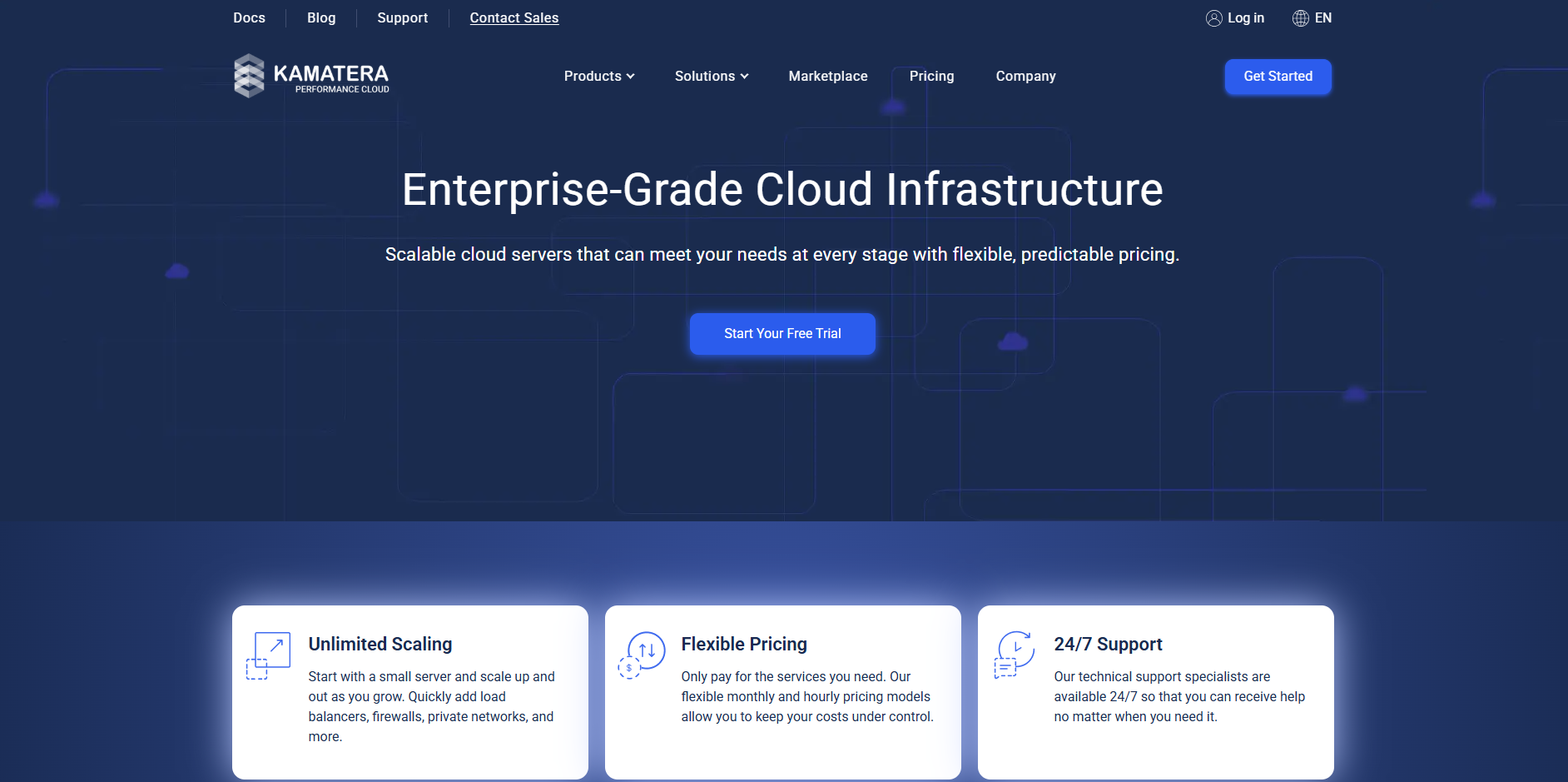 Kamatera gives businesses full flexibility when it comes to configuring cloud environments. Unlike providers with fixed packages, Kamatera lets you choose exactly how many CPUs, how much RAM, and what type of storage you want.
Kamatera gives businesses full flexibility when it comes to configuring cloud environments. Unlike providers with fixed packages, Kamatera lets you choose exactly how many CPUs, how much RAM, and what type of storage you want.
This makes it ideal for teams with specialised workloads that need tailored setups.
Its global data centres give it an edge over EU-only providers like Scaleway and Hetzner. The downside, however, is that Kamatera requires more technical expertise.
It’s not as beginner-friendly as DigitalOcean or Kuberns, so non-technical teams might struggle with the learning curve.
- Pros: Highly customizable infrastructure, global coverage, scalable resources.
- Cons: Complex for beginners, requires technical expertise.
- Best For: Enterprises, IT teams, and advanced users needing fully customizable IaaS.
Check out the Top Kamatera alternatives for developers.
5. DigitalOcean
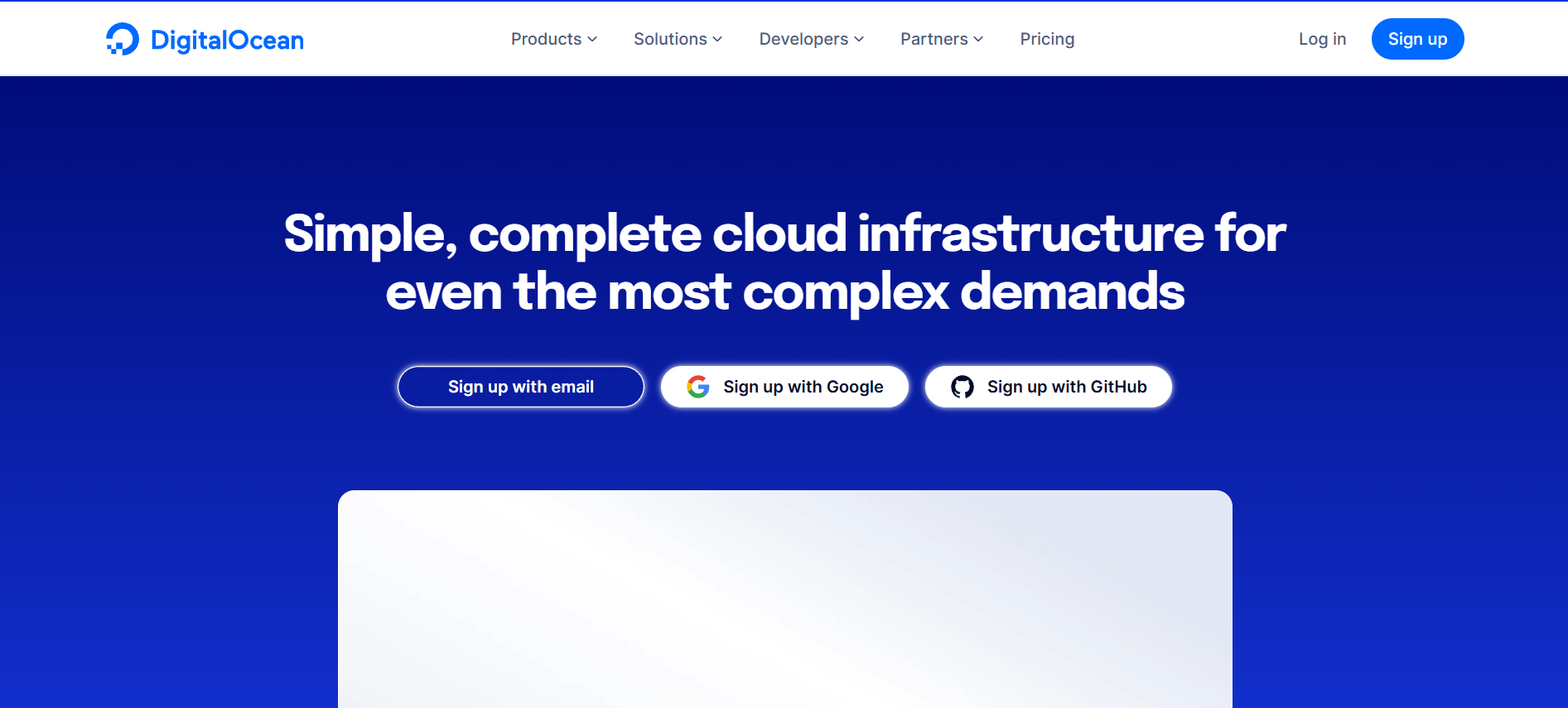 DigitalOcean is widely known as a developer-friendly cloud hosting provider that simplifies infrastructure for startups and SMBs. Its droplets (virtual machines) and flat monthly pricing make it easy for small teams to launch projects without unexpected costs.
DigitalOcean is widely known as a developer-friendly cloud hosting provider that simplifies infrastructure for startups and SMBs. Its droplets (virtual machines) and flat monthly pricing make it easy for small teams to launch projects without unexpected costs.
That said, DigitalOcean has fewer enterprise-grade features compared to hyperscalers like Azure or GCP. As applications grow, businesses often outgrow DigitalOcean and move to more scalable platforms.
- Pros: Beginner-friendly UI, predictable pricing, excellent documentation.
- Cons: Limited advanced features, costs increase with add-ons.
- Best For: Startups and SMBs building SaaS, e-commerce, or client projects.
Here are the Best DigitalOcean alternatives of 2025
6. Linode (by Akamai)
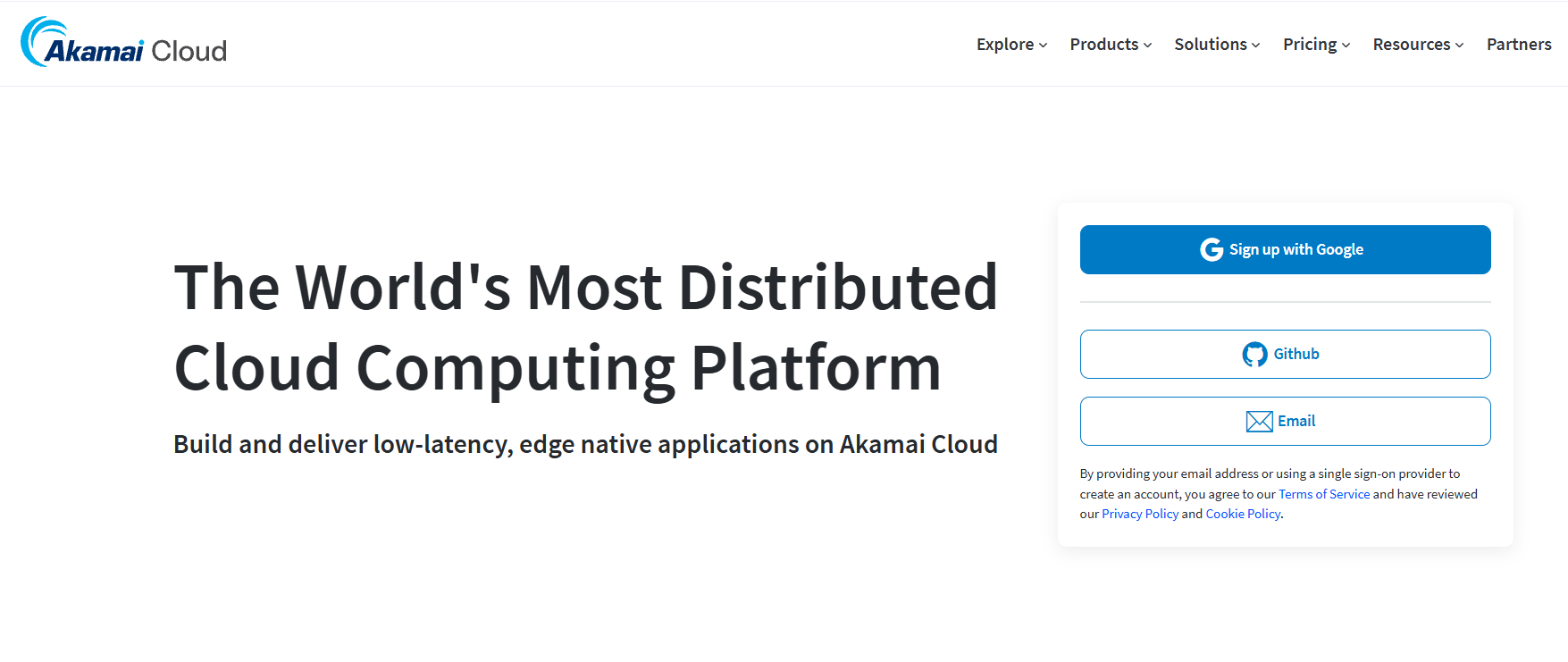 Linode has long been a popular choice among developers for its affordable VPS hosting and straightforward management. Since its acquisition by Akamai, it has expanded into edge computing and enterprise offerings, making it a stronger alternative in 2025.
Linode has long been a popular choice among developers for its affordable VPS hosting and straightforward management. Since its acquisition by Akamai, it has expanded into edge computing and enterprise offerings, making it a stronger alternative in 2025.
Linode’s biggest strength is its reliability and community support, but some businesses remain cautious as Akamai continues to integrate it into its broader ecosystem.
- Pros: Reliable, affordable, strong developer community.
- Cons: Still evolving under Akamai, fewer advanced integrations.
- Best For: Developers and SMBs that want simple, affordable cloud hosting.
If you are exploring the Linode alternatives, read this.
7. UpCloud
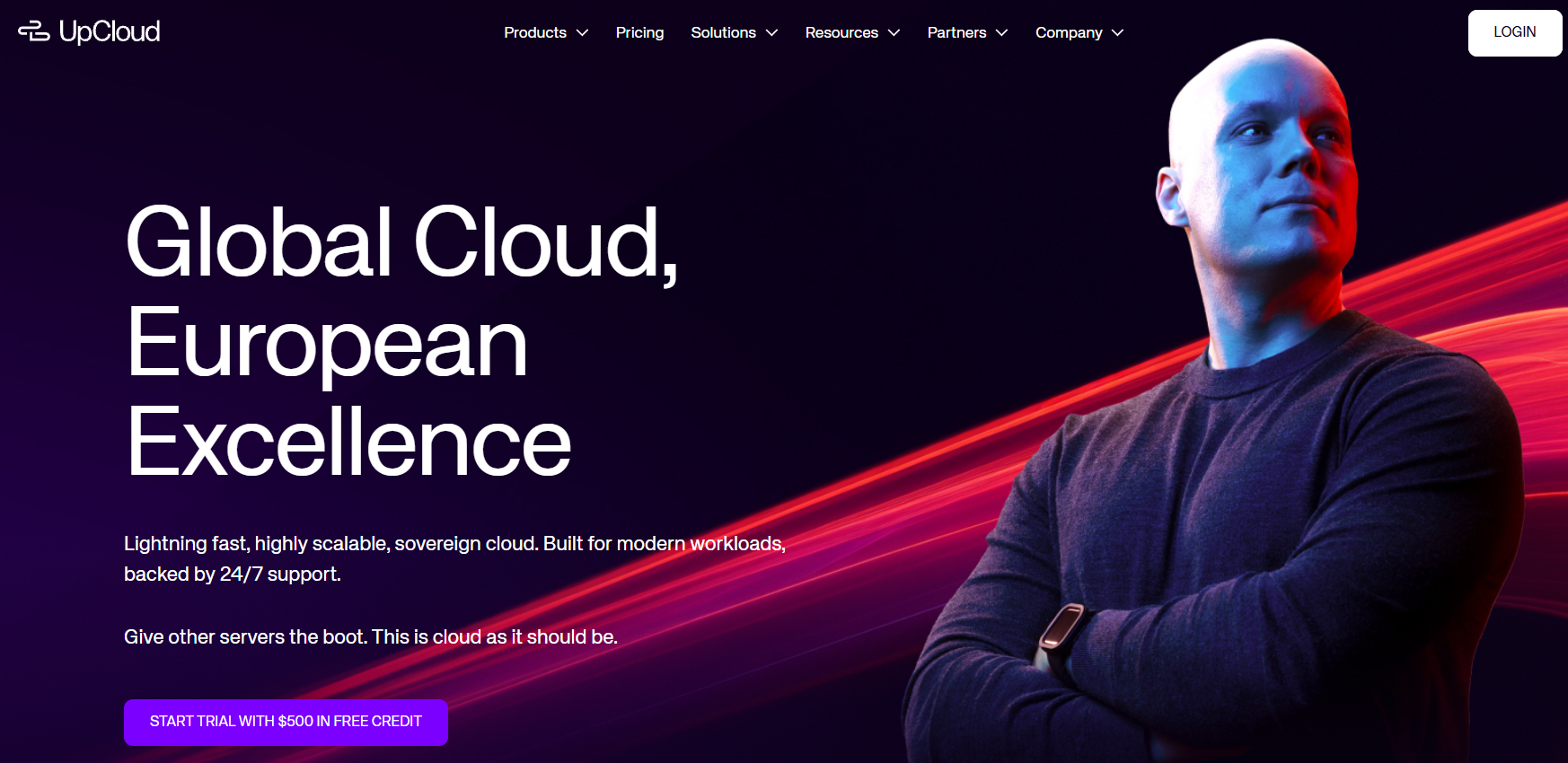 UpCloud is less well-known globally but has gained traction as a performance-focused cloud provider. It claims faster performance than many competitors due to its MaxIOPS storage technology, making it appealing to developers who need speed.
UpCloud is less well-known globally but has gained traction as a performance-focused cloud provider. It claims faster performance than many competitors due to its MaxIOPS storage technology, making it appealing to developers who need speed.
Its ecosystem is smaller compared to AWS or Azure, but for businesses that prioritise performance per dollar, it’s a compelling option.
- Pros: High performance, transparent pricing, reliable uptime.
- Cons: Smaller ecosystem, fewer global data centres.
- Best For: Developers and small businesses that want performance-driven cloud hosting.
8. Google Cloud Platform (GCP)
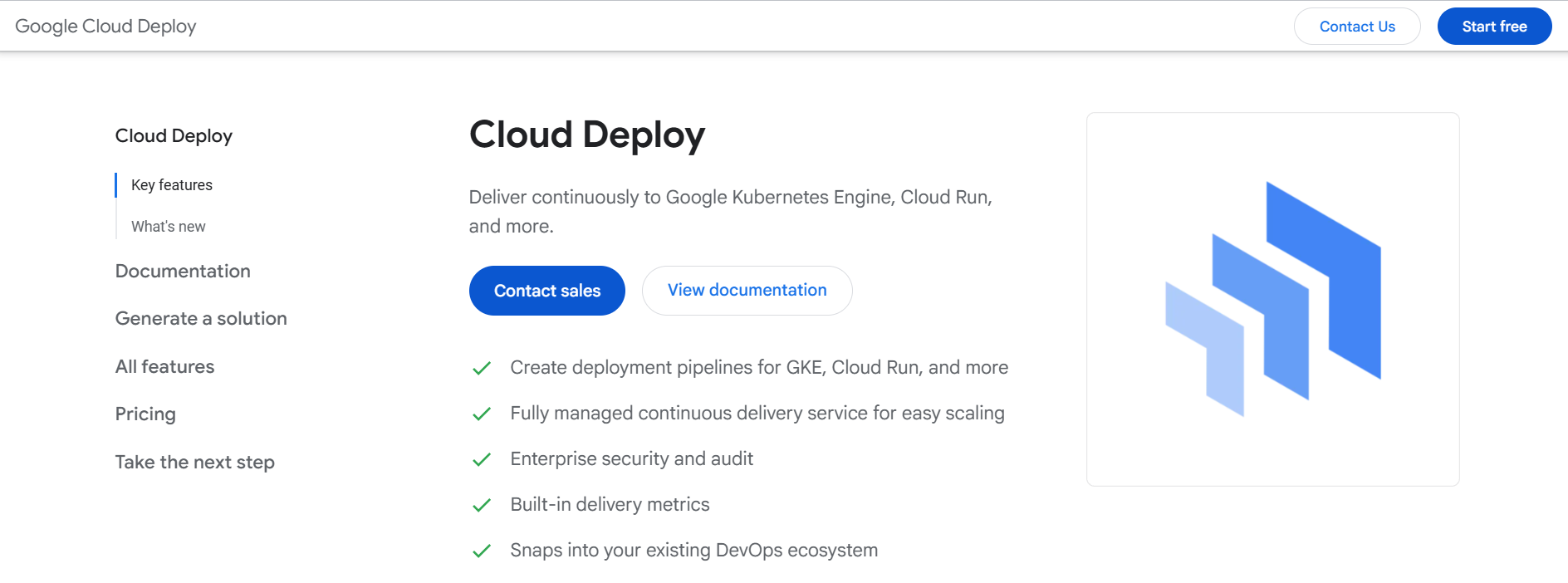 GCP is a leading enterprise cloud provider, trusted by large organisations for AI, ML, and big data workloads. It offers one of the widest global infrastructures, making it a natural choice for businesses scaling worldwide.
GCP is a leading enterprise cloud provider, trusted by large organisations for AI, ML, and big data workloads. It offers one of the widest global infrastructures, making it a natural choice for businesses scaling worldwide.
The downside is that GCP’s pricing is complex, and managing its services requires technical expertise. For enterprises with in-house IT teams, GCP provides unmatched innovation and scale.
- Pros: Global data centres, cutting-edge AI/ML services, enterprise compliance.
- Cons: Pricing complexity, steep learning curve.
- Best For: Enterprises, AI-driven startups, global SaaS companies.
Read This: Google Cloud alternatives
9. Microsoft Azure
 Azure is another hyperscaler widely chosen by enterprises, particularly those already using Microsoft services like Office 365 or Active Directory. It offers hybrid cloud capabilities, making it a go-to for regulated industries like finance, government, and healthcare.
Azure is another hyperscaler widely chosen by enterprises, particularly those already using Microsoft services like Office 365 or Active Directory. It offers hybrid cloud capabilities, making it a go-to for regulated industries like finance, government, and healthcare.
However, Azure can be costly and complex for smaller teams, making it less appealing to startups compared to simpler options like Kuberns or DigitalOcean.
- Pros: Huge ecosystem, enterprise-grade compliance, strong hybrid cloud features.
- Cons: Complex pricing, steep learning curve for SMBs.
- Best For: Enterprises, regulated industries, and organisations with Microsoft integrations.
Related Reading: Azure alternatives
These nine providers represent the most relevant Scaleway alternatives in 2025.
Some are cost-driven (Hetzner, OVH), others are enterprise-focused (Azure, GCP), and some like Kuberns combine simplicity, cost savings, and scalability in one platform.
Scaleway vs Alternatives: Overview
Choosing between Scaleway and its alternatives often comes down to pricing, global reach, ease of use, and whether the platform can handle modern workloads.
Here’s a high-level comparison to help you see where each provider stands:
| Provider | Pricing Model | Ease of Use | Global Coverage | Best Suited For |
|---|---|---|---|---|
| Scaleway | Affordable entry pricing, unpredictable bandwidth costs | Moderate – geared toward EU developers | EU-focused (France, Netherlands, Poland) | Small EU startups, developers on a budget |
| Kuberns | Transparent AWS-backed pricing, up to 40% savings | Very easy – one-click deploy, Git-based CI/CD | Global AWS infrastructure | Startups, SaaS, agencies needing cost savings & scale |
| OVHcloud | Competitive EU pricing | Less beginner-friendly, enterprise-focused | Strong in Europe, expanding globally | Enterprises, compliance-heavy industries |
| Hetzner | Ultra-low pricing | Moderate | Limited to EU data centers | Budget-conscious EU startups & dev teams |
| Kamatera | Fully customizable pay-as-you-use | Complex for beginners | Global coverage | Enterprises, IT teams with custom setups |
| DigitalOcean | Predictable flat pricing | Very easy, developer-friendly | Global but smaller footprint than hyperscalers | Startups, SMBs, agencies |
| Linode (Akamai) | Affordable plans, evolving edge features | Easy for developers | Growing global presence under Akamai | Developers, SMBs |
| UpCloud | Transparent pricing | Developer-friendly | Smaller global footprint | Performance-focused developers & SMBs |
| GCP | Pay-as-you-go, complex pricing | Requires technical expertise | Extensive global coverage | Enterprises, AI/ML and data-heavy startups |
| Azure | Pay-as-you-go with enterprise licensing | Complex for SMBs, better for enterprises | Massive global infrastructure | Enterprises, regulated industries |
Why Choose Kuberns as a Scaleway Alternative?
For many businesses, Scaleway is a good entry point into the cloud, especially for developers in Europe. But as teams grow, the need for global coverage, predictable pricing, and developer-friendly automation becomes more important.
This is where Kuberns is often seen as the smarter Scaleway alternative.
Here’s why:
Cost Savings Without Compromise
Unlike Scaleway, which can surprise businesses with egress and bandwidth charges, Kuberns offers transparent AWS-backed pricing with up to 40% savings. This makes it easier for startups and enterprises alike to plan infrastructure costs without unexpected spikes.
Global Reach Beyond Europe
Scaleway’s strength is in Europe, but businesses with customers in North America or Asia often face latency issues. Kuberns runs on AWS global infrastructure, ensuring low latency and consistent performance for worldwide audiences.
Built for Modern Workloads
Where Scaleway’s services are more limited, Kuberns provides everything teams need to run SaaS products, APIs, and containerised apps out of the box. CI/CD pipelines, monitoring, scaling, and logs are integrated into the platform, removing the need for multiple third-party tools.
Developer-Friendly Simplicity
Kuberns takes the complexity out of deployment. With one-click Git-based deployments and AI-powered scaling, developers and agencies can ship faster without hiring large DevOps teams. This simplicity is a key differentiator compared to traditional IaaS providers.
Hands-On Support
Businesses moving away from Scaleway often mention limited support as a concern. Kuberns addresses this with responsive, hands-on assistance, making migrations smoother and operations stress-free.
In short, Kuberns combines the ease of managed hosting with the scalability of IaaS, giving businesses the best of both worlds.
It’s a strong choice for companies that have outgrown Scaleway and want infrastructure that scales with their ambitions.
The Smarter Path Beyond Scaleway
Scaleway is a solid choice for early-stage projects and EU-based startups, but as businesses grow, its limitations in pricing transparency, global reach, and scalability often become clear.
That’s why so many teams start looking for Scaleway alternatives that provide predictable costs, developer-friendly automation, and infrastructure that can scale with their ambitions.
From OVHcloud and Hetzner for cost-conscious European businesses, to DigitalOcean and Linode for developer-friendly simplicity, and GCP and Azure for enterprise-scale workloads, there are plenty of options in 2025. But for businesses that want the balance of simplicity, cost efficiency, and global infrastructure, Kuberns stands out.
By combining AWS-backed infrastructure with AI-powered optimisation, Kuberns helps startups, agencies, and enterprises save up to 40% on cloud costs while simplifying deployment through one-click Git-based workflows, CI/CD pipelines, and built-in monitoring.
If you’re considering a Scaleway alternative, start with Kuberns today and experience cloud hosting that grows with your business, without the complexity or unpredictable costs.

Frequently Asked Questions on Scaleway Alternatives
1. Why do businesses look for Scaleway alternatives?
Most businesses search for Scaleway alternatives because of limited global data centres, unpredictable egress costs, and a smaller ecosystem of services. While it works well for EU startups, scaling globally often requires more coverage and automation features.
2. Which is the best Scaleway alternative for startups?
For startups, the best Scaleway alternative is one that balances cost and simplicity. Platforms like DigitalOcean and Linode are popular for their ease of use, but many growing startups prefer Kuberns, since it combines predictable pricing and one-click deployments with global AWS infrastructure.
3. Is Scaleway reliable for enterprise workloads?
Scaleway is reliable for small to mid-sized projects, but enterprises in industries like finance, healthcare, or logistics often need stronger SLAs, compliance, and 24/7 support. In such cases, hyperscalers like GCP or Azure, or modern platforms like Kuberns, are better suited.
4. What is the main disadvantage of Scaleway?
The main disadvantages of Scaleway are its limited regional presence outside Europe and unpredictable bandwidth costs. These issues make it harder for businesses with global users or heavy data transfer needs to scale effectively.
5. Can I migrate easily from Scaleway to another provider?
Yes. Most Scaleway alternatives offer migration tools or hands-on support. With Kuberns, for example, you can connect your code repository and deploy applications in just a few clicks, making migration simple and low-risk.
6. Which Scaleway alternative has the best global coverage?
Providers like AWS (via Kuberns), GCP, and Azure offer the widest global reach with data centres across every region. For cost-conscious EU businesses, Hetzner or OVHcloud remain strong local options, while Kuberns provides the balance of global coverage and cost savings.